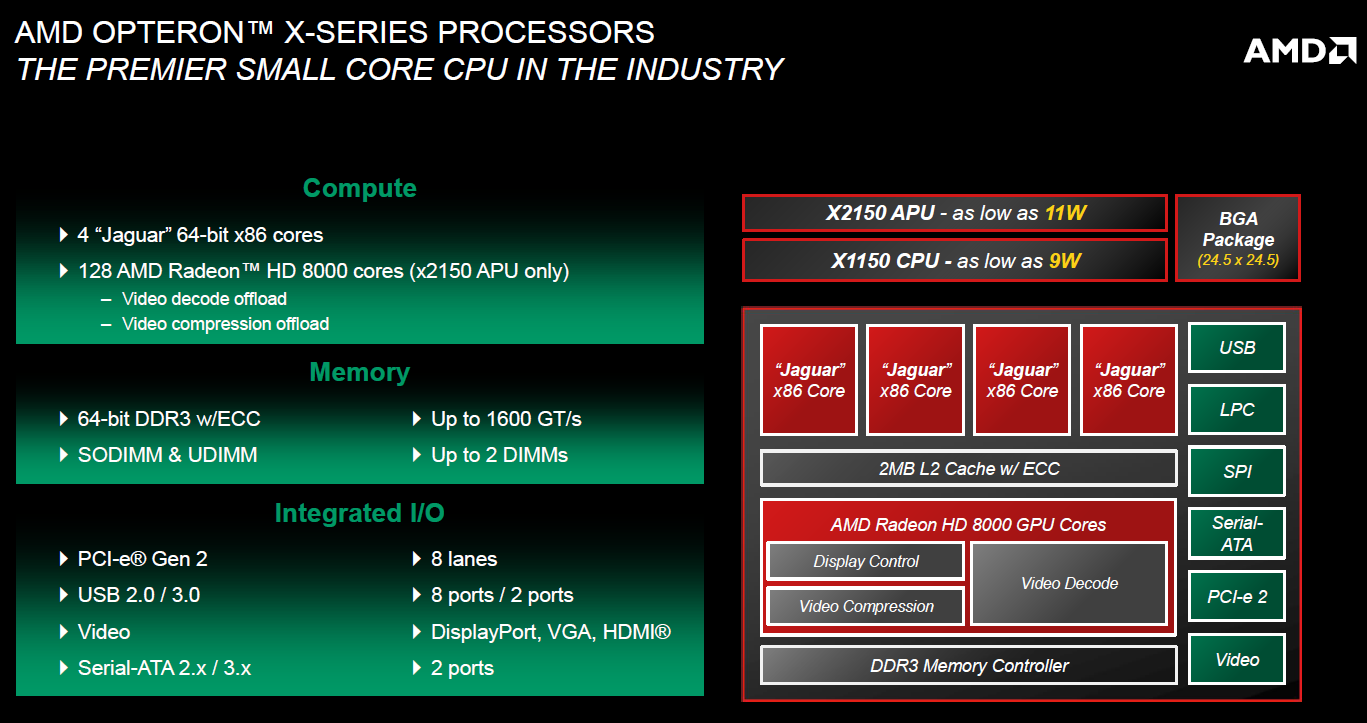Displaying items by tag: Virtualiztion
Microsoft dropped an Xbox 360 Virtual Console into the Xbox One
When Microsoft and Sony announced the move to x86-64 based gaming consoles some (pronounce that many) in the gaming community were more than a little annoyed that they would not be able to play their older games. Both companies hoped that the move would drive gaming innovation and also get people to buy new games as well as leave the option for developers to create new versions of older games with improved graphics. We saw both of these start to happen during the first few months of the Xbox One and PS4’s life. Now that things are settling down we are finally getting to a time when companies are going to circle back around to those older games.
AMD Launches the Opteron X Series x86 SoC To Compete Head to Head With Intel's Atom
 |
AMD kicked an interesting product out the door today in the form of their Operton X-Series APU SoC. You might remember that the possibility of this APU was leaked a while ago by an inadvertent inclusion on a slide showing the Operton X logo. Everyone knew this was going to fold over into an x86 APU based SoC and the launch was just a matter of time. Now the lid is off and we can talk about the Opteron X (Kyoto) and where AMD sees this new product in their server business and in the market as a whole.
Windows 8 to support a full version of Hyper-V
 Microsoft just announced that they are including Hyper-V with the next versio n of Windows. This now makes the third (in our opinion) most interesting new feature to be included with Windows 8. We have briefly talked about the other two (USB optimizations and the new File Management system). This new feature, however, is something that could have a big impact... on VMware. You see right nowVMware is one of the leading companies in virtualiation and their products are in use by a large number of people (incuding us). Of course Microsoft tried to include a type of Hyper-V in Winows 7 (XP-Mode) but that did not go over so well. This time things are a little different.
Microsoft just announced that they are including Hyper-V with the next versio n of Windows. This now makes the third (in our opinion) most interesting new feature to be included with Windows 8. We have briefly talked about the other two (USB optimizations and the new File Management system). This new feature, however, is something that could have a big impact... on VMware. You see right nowVMware is one of the leading companies in virtualiation and their products are in use by a large number of people (incuding us). Of course Microsoft tried to include a type of Hyper-V in Winows 7 (XP-Mode) but that did not go over so well. This time things are a little different.
The Hyper-V that will be included with Widows 8 includes a llittle more than the XP Mode that is on the current flavor of Windows. For starters you wll not be able to run this unless you have a 64-bit CPU and at least 4GB of RAM. On top of all that you will need to have a CPU that supports Second Level Address Translation. Now this is not a networking term but relates to memory addressing and is a feature that has only popped up in the last few generations of CPUs from Intel and AMD. I wonder, if there is any chance that Microsoft will enable this feature for the ARM archiceture and allow a sort of "dual boot" mode with the guest OS taking the lead in system resources and the Host becoming a background task just to keep the Guest operational. In all honesty I am just waiting to see what tablet manufacturers are going to offer Windows 8 drivers for existing ARM tablets. I will be very interesting to see things a they unfold leading up to November of 2012.
Source Windows 8 Blog
Discuss in our Forum
